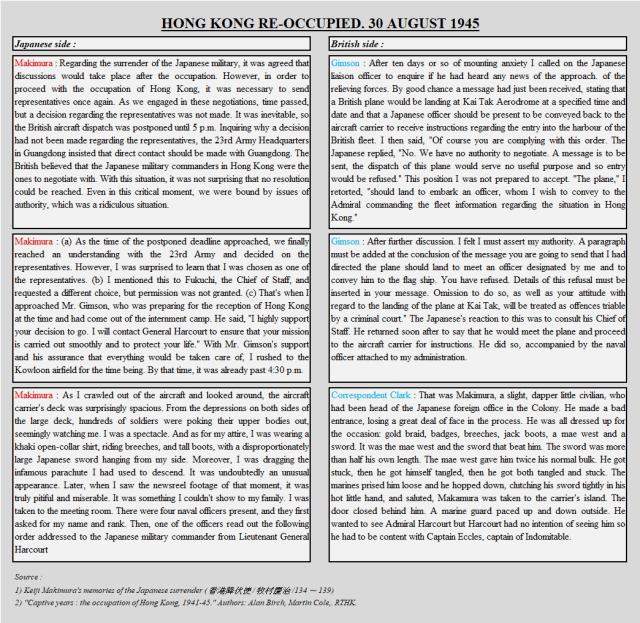Sources :
1) Keiji Makimura's memories of the Japanese surrender (Japanese) (English)
2) "Captive years : the occupation of Hong Kong, 1941-45." Authors: Alan Birch, Martin Cole,. RTHK.
| Japanese side : | British side : | |
| Makimura : Regarding the surrender of the Japanese military, it was agreed that discussions would take place after the occupation. However, in order to proceed with the occupation of Hong Kong, it was necessary to send representatives once again. As we engaged in these negotiations, time passed, but a decision regarding the representatives was not made. It was inevitable, so the British aircraft dispatch was postponed until 5 p.m. Inquiring why a decision had not been made regarding the representatives, the 23rd Army Headquarters in Guangdong insisted that direct contact should be made with Guangdong. The British believed that the Japanese military commanders in Hong Kong were the ones to negotiate with. With this situation, it was not surprising that no resolution could be reached. Even in this critical moment, we were bound by issues of authority, which was a ridiculous situation. | Gimson : After ten days or so of mounting anxiety I called on the Japanese liaison officer to enquire if he had heard any news of the approach of the relieving forces. By good chance a message had just been received, stating that a British plane would be landing at Kai Tak Aerodrome at a specified time and date and that a Japanese officer should be present to be conveyed back to the aircraft carrier to receive instructions regarding the entry into the harbour of the British fleet. I then said, "Of course you are complying with this order." The Japanese replied, "No. We have no authority to negotiate. A message is to be sent, the dispatch of this plane would serve no useful purpose and so entry would be refused." This position I was not prepared to accept. "The plane," I retorted, "should land to embark an officer, whom I wish to convey to the Admiral commanding the fleet information regarding the situation in Hong Kong." | |
| Makimura : (a) As the time of the postponed deadline approached, we finally reached an understanding with the 23rd Army and decided on the representatives. However, I was surprised to learn that I was chosen as one of the representatives. (b) I mentioned this to Fukuchi, the Chief of Staff, and requested a different choice, but permission was not granted. (c) That's when I approached Mr. Gimson, who was preparing for the reception of Hong Kong at the time and had come out of the internment camp. He said, "I highly support your decision to go. I will contact General Harcourt to ensure that your mission is carried out smoothly and to protect your life." With Mr. Gimson's support and his assurance that everything would be taken care of, I rushed to the Kowloon airfield for the time being. By that time, it was already past 4:30 p.m. | Gimson : After further discussion. I felt I must assert my authority. A paragraph must be added at the conclusion of the message you are going to send that I had directed the plane should land to meet an officer designated by me and to convey him to the flag ship. You have refused. Details of this refusal must be inserted in your message. Omission to do so, as well as your attitude with regard to the landing of the plane at Kai Tak, will be treated as offences triable by a criminal court." The Japanese's reaction to this was to consult his Chief of Staff. He returned soon after to say that he would meet the plane and proceed to the aircraft carrier for instructions. He did so, accompanied by the naval officer attached to my administration. | |
| Makimura : As I crawled out of the aircraft and looked around, the aircraft carrier's deck was surprisingly spacious. From the depressions on both sides of the large deck, hundreds of soldiers were poking their upper bodies out, seemingly watching me. I was a spectacle. And as for my attire, I was wearing a khaki open-collar shirt, riding breeches, and tall boots, with a disproportionately large Japanese sword hanging from my side. Moreover, I was dragging the infamous parachute I had used to descend. It was undoubtedly an unusual appearance. Later, when I saw the newsreel footage of that moment, it was truly pitiful and miserable. It was something I couldn't show to my family. I was taken to the meeting room. There were four naval officers present, and they first asked for my name and rank. Then, one of the officers read out the following order addressed to the Japanese military commander from Lieutenant General Harcourt | Correspondent Clark : That was Makimura, a slight, dapper little civilian, who had been head of the Japanese foreign office in the Colony. He made a bad entrance, losing a great deal of face in the process. He was all dressed up for the occasion: gold braid, badges, breeches, jack boots, a mae west and a sword. It was the mae west and the sword that beat him. The sword was more than half his own length. The mae west gave him twice his normal bulk. He got stuck, then he got himself tangled, then he got both tangled and stuck. The marines prised him loose and he hopped down, clutching his sword tightly in his hot little hand, and saluted, Makamura was taken to the carrier's island. The door closed behind him. A marine guard paced up and down outside. He wanted to see Admiral Harcourt but Harcourt had no intention of seeing him so he had to be content with Captain Eccles, captain of Indomitable. |
Date picture taken
unknown
Shows person / people
